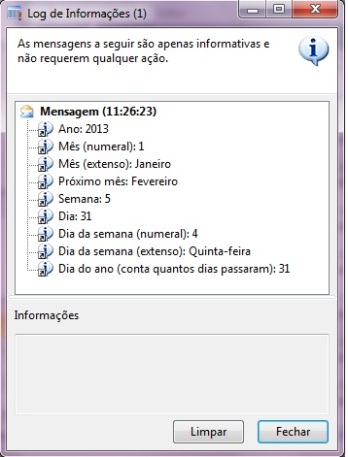30/11/2012
por Roberta Freitas
Depois de bem mais de um ano sem fazer uma única postagem, venho postar algo de interesse para quem está passando por um problema chatíssimo: índices de campos.
Este script recria os registros dos Ids da tabela desejada que não se encontram na SqlDictionary.
Quem já teve a experiência de participar de uma migração, por exemplo, deve ter se deparado com este problema.
#macrolib.DictField
// This type is used instead of Types::Int64 for fields of type
// RecId/RefRecId/createdTransactionId/modifiedTransactionId
#define.RecIdBaseType (49)
// For nonsystem fields of type UtcDateTime an additional field is created
// that holds the actual time zone in which the value has been set
#define.TZIDsuffix ('_TZID')
SqlDictionary sqlDict;
SysdictType dictType;
DictTable dictTable;
DictField dictField;
ArrayIdx arrIdx;
Counter numOfSqlFields; // number of records created in SqlDictionary
fieldName fieldName;
fieldId fieldId;
tableId tableId = tablenum(TheTable2Fix); // TARGET
boolean processTableField(
DictField _dictField,
ArrayIdx _arrIdx,
boolean _isTzIdField = false
)
{
ArrayIdx dictArrIdx;
str infoName; // this field name is for messages only
FieldName sqlName;
boolean ret;
;
if (_isTzIdField)
{
if ( _dictField.baseType() != Types::UtcDateTime
|| _dictField.id() == fieldnum(Common, createdDateTime)
|| _dictField.id() == fieldnum(Common, modifiedDateTime)
)
{
throw error(Error::wrongUseOfFunction(funcname()));
}
dictArrIdx = _dictField.arraySize() + _arrIdx;
sqlName = _dictField.dateTimeTimeZoneRuleFieldName(_arrIdx - 1);
infoName = _dictField.name() + #TZIDsuffix;
}
else
{
dictArrIdx = _arrIdx;
sqlName = _dictField.name(DbBackend::Sql, _arrIdx);
infoName = _dictField.name();
}
select firstonly sqlDict
where sqlDict.tabId == _dictField.tableid()
&& sqlDict.fieldId == _dictField.id()
&& sqlDict.array == dictArrIdx
;
if (!sqlDict)
{
sqlDict.clear();
sqlDict.initValue();
sqlDict.tabId = _dictField.tableid();
sqlDict.fieldId = _dictField.id();
sqlDict.array = dictArrIdx;
sqlDict.name = strupr(_dictField.name(DbBackend::Native, _arrIdx));
sqlDict.sqlName = sqlName;
dictType = new SysDictType(_dictField.typeId());
if (_isTzIdField)
{
sqlDict.fieldType = Types::Integer;
}
else
if ( _dictField.id() == fieldnum(Common, RecId)
|| _dictField.id() == fieldnum(Common, createdTransactionId)
|| _dictField.id() == fieldnum(Common, modifiedTransactionId)
|| _dictField.typeId() == extendedtypenum(RecId)
|| _dictField.typeId() == extendedtypenum(RefRecId)
|| ( dictType
&& dictType.isExtending(extendedtypenum(RecId))
)
)
{
// This type is used instead of Types::Int64 for fields of type
// RecId/RefRecId/createdTransactionId/modifiedTransactionId
sqlDict.fieldType = #RecIdBaseType;
}
else
{
sqlDict.fieldType = _dictField.baseType();
}
sqlDict.strSize = _dictField.stringLen();
sqlDict.shadow = bitTest(_dictField.flags(), #DBF_SHADOW);
sqlDict.rightJustify = bitTest(_dictField.flags(), #DBF_RIGHT);
sqlDict.flags = sqlDict.shadow; // not _dictField.flags() at all!
sqlDict.nullable = _dictField.baseType() == Types::Container
|| _dictField.baseType() == Types::VarString
;
if (sqlDict.validateWrite())
{
sqlDict.insert();
ret = true;
info(strfmt(@"Created record for field %1.%2%3",
dictTable.name(), infoName,
_dictField.arraySize() > 1 ? strfmt(@"[%1]", _arrIdx) : ''));
// for all nonsystem UtcDateTime fields we also create a related TZID-field
if ( !_isTzIdField
&& _dictField.baseType() == Types::UtcDateTime
&& _dictField.id() != fieldnum(Common, createdDateTime)
&& _dictField.id() != fieldnum(Common, modifiedDateTime)
)
{
processTableField(_dictField, _arrIdx, true);
}
}
else
{
ret = checkFailed(strfmt(@"%1 record for %2.%3 was not created",
tablestr(SqlDictionary), dictTable.name(), infoName));
}
}
return ret;
}
;
dictTable = new DictTable(tableId);
if (!dictTable)
{
throw error(strfmt(@"Failed to create %1 for '%2' (%3)",
classstr(DictTable), tableid2name(tableId), tableId));
}
if (dictTable.isSystemTable())
{
throw error(strfmt(@"'%1' is a system table, no way...", dictTable.name()));
}
if (!dictTable.isSql())
{
throw error(strfmt(@"Table '%1' should not be in DB", dictTable.name()));
}
for (fieldId = dictTable.fieldNext(0); fieldId; fieldId = dictTable.fieldNext(fieldId))
{
dictField = dictTable.fieldObject(fieldId);
if (dictField && dictField.isSql())
{
fieldName = dictField.name();
for (arrIdx = 1; arrIdx <= dictField.arraySize(); arrIdx++)
{
numOfSqlFields++;
processTableField(dictField, arrIdx);
}
}
}
select firstonly sqlDict
where sqlDict.tabId == tableId
&& sqlDict.fieldId == 0
;
if (!sqlDict)
{
sqlDict.clear();
sqlDict.initValue();
sqlDict.tabId = tableId;
sqlDict.name = strupr(dictTable.name());
sqlDict.sqlName = dictTable.name(DbBackend::Sql);
sqlDict.strSize = numOfSqlFields; // for the table "header" - num of fields
sqlDict.flags = dictTable.isView(); // that's the way it is
sqlDict.insert();
info(strfmt(@"Created record for table %1", dictTable.name()));
}
Créditos: http://gl00mie.blogspot.com.br/
Compartilhe o conhecimento:


